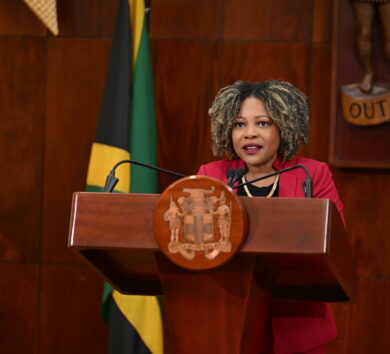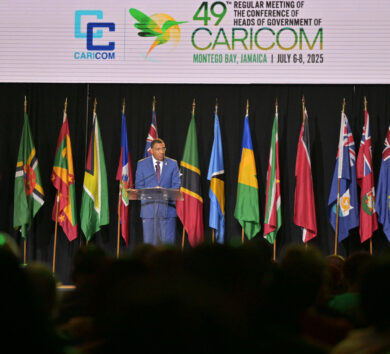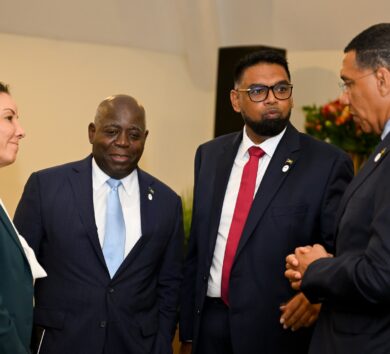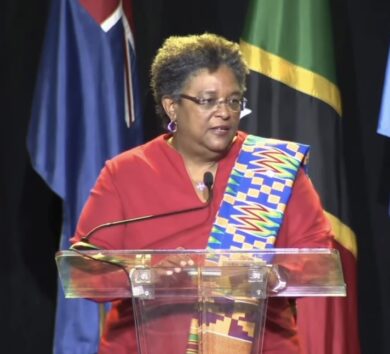
The Office of the Jamaican Prime Minister (OPM) in has been found wanting in its management of the Constituency Development Fund (CDF), which provides Members of Parliament with financial resources to execute approved social and economic programmes within their constituencies.
The Auditor General (AG) Department, which carried out an audit of the management of the multi-million dollar fund did uncover any specific case of fraud. However, the audit revealed that “the OPM did not have an effective risk management system or fraud prevention plan in place to prevent, detect and respond effectively to fraud risks as required by the Financial Management Regulations.”
The audit found an “elevated risk of exploitation and misuse of funds in relation to Educational Development Projects, as benefits provided under these projects were not administered in keeping with any established objective criteria or documented guidelines to ensure transparency and equity. Additionally, the relevant unit within the OPM did not effectively monitor the implementation of all CDF projects to ensure that the planned targets and objectives were achieved.”
As a result, Auditor General, Pamela Monroe Ellis is urging the OPM to strengthen the risk management system relating to the CDF, which was established in 2008 as well as to improve the monitoring and controls over CDF projects/activities. The OPM has committed to improving the system of controls and has already started addressing some of the weaknesses highlighted in this report.

The audit sought to determine whether the activities of the CDF were conducted in a transparent and effective manner in keeping with Government of Jamaica guidelines and whether management implemented the necessary controls to effectively identify, monitor and manage potential risks, including the risk of fraud.
Questionable benefits under the Educational Development Projects
The AG audit identified 21 beneficiaries, who received a total of $2,465,900 to offset educational expenses at private educational institutions. Of this number, one family received financial assistance totalling $1,170,000.
The father of the beneficiaries was an employee in the constituency office of a former Member of Parliament. While another beneficiary, who received financial assistance totalling $92,000 is the child of an employee of the Constituency Development Fund Programme Management Unit (CDFPMU), which manages the CDF, also acting as a secretariat with responsibility for the disbursement of the fund.
The audit identified two other instances of payments on behalf of connected parties totalling $860,850. In the first case, payments totalling $190,000 in 2016/2017 and 2017/2018 were made to a university on behalf of an employee of the Ministry of Economic Growth and Job Creation, who was actively involved in the implementation of CDF projects at the ministry to offset the cost of a post-graduate degree.

The second case involved payments totalling $670,850 in 2016/2017 and 2017/2018 to another tertiary institution from the CDF of a Member of Parliament (MP) on behalf of the MP’s relative to offset the cost of a bachelor’s degree. Monroe Ellis indicated that the OPM/CDFPMU has since indicated that this matter “will be brought to the attention of the CDF parliamentary committee and consultation will be had with the MOFPS with respect to guidelines and established criteria”.
Key findings of the audit
Among the key findings of the audit is the absence of an effective risk management system or fraud prevention plan. The OPM/CDFPMU did not have an effective risk management system or fraud prevention plan to prevent, detect and respond effectively to fraud risks as required by the Financial Management Regulations.
Furthermore, the CDFPMU’s Strategic Plans did not include the assessment of potential risks and the OPM’s Internal Audit Unit did not conduct frequent reviews of CDF operations to identify areas for improving risk management. Consequently, the CDFPMU was more vulnerable to the occurrence and impact of potential risks, including fraud.
The OPM/CDFPMU has since taken steps to strengthen its risk management system by implementing a risk register and has included risk management in its 2020/2021 operational plan. The AG audit further found inadequate controls over CDF disbursements.
“The OPM/CDFPMU did not have an effective system in place to ensure that a periodic reconciliation of all CDF disbursements was undertaken in a timely manner to identify anomalies,” Monroe Ellis declared. There were disbursement anomalies where the OPM/CDFPMU subsequently indicated that some of the excesses may be due to incorrect postings and refunded amounts that were subsequently re-distributed.
OPM/CDFPMU indicated that a comprehensive reconciliation is being undertaken to resolve the anomalies and that the Unit’s staff complement will be strengthened by the recruitment of a Senior Project Officer – Budgeting and Accounting “whose primary responsibility will be to monitor and reconcile in a timely manner, all CDF accounts including those held by implementing MDAs” (Ministries, Departments and Agencies).
The AG’s analysis of the disbursement records of the OPM for the five-year period under review April 2015 to March 2020 revealed that some $4.46 billion have been disbursed in total to seven agencies. However, the agencies indicated that they received $4.21 billion while the CDFPMU’s records disclosed that the total disbursements approved for the seven agencies during the period were $4.24 billion.

According to the AG, “our review also revealed that funds disbursed relating to 46 constituencies over the period 2015/2016 to 2019/2020 exceeded their approved budget by approximately $85.39 million.”
Inadequate monitoring of CDF projects
The OPM/CDFPMU did not effectively monitor the implementation of all CDF projects to ensure that the planned targets and objectives were achieved. The breakdown in the CDFPMU’s monitoring function also contributed to the delayed implementation of sixteen projects valued at approximately $26.9 million, which were approved between the financial years 2013/2014 and 2018/2019.
Follow-up checks revealed that approximately $4.95 million in relation to six projects has since been returned to the CDF, one project was completed, and three projects were in progress. There was still no evidence that the remaining six projects had started.
The monitoring officers assigned to monitor the implementation of projects in each constituency only provided approximately 51% of the required monthly reports to the CDFPMU. CDFPMU subsequently advised that it has since recruited additional Project Officers to reinforce its monitoring function.
Projects in six constituencies were not monitored for two years due to the absence of an assigned monitoring officer. There was no evidence to indicate that the CDFPMU took the necessary steps to request the outstanding reports or implemented appropriate alternative measures to monitor the projects in the constituencies without an assigned monitoring officer to ensure that the planned activities were executed and the intended objectives achieved within the estimated budget.
CDFPMU has since indicated that it continues to issue quarterly reminders to implementing agencies in respect of their outstanding reports and will consider the withholding of agency fees if reports are not forthcoming in the future. Twelve implementing agencies, which received funds totalling approximately $204.7 million did not provide the relevant reports to the CDFPMU as required.

Consequently, the CDFPMU was not able to effectively monitor the projects that were managed by these agencies in keeping with its oversight responsibility.
Key recommendations
1. Given that CDF projects are implemented by several separate autonomous implementing agencies, the CDFPMU should ensure that there is an effective risk management system in place to identify, monitor and manage the material risks to which the CDF may be exposed. This system should include a fraud prevention plan as required by the Financial Management Regulations as well as frequent reconciliations of all CDF disbursements to identify anomalies.
2. The CDFPMU should strengthen its monitoring function to ensure that all CDF projects and activities are effectively implemented, and their objectives and targets are achieved within the planned time and budget.
3. Steps should be taken to establish objective criteria and clear guidelines for the implementation of Educational Development Projects to ensure that these projects are administered in a fair and transparent manner and reduce the risk of exploitation, nepotism and misuse of funds distributed for these projects.







Comments